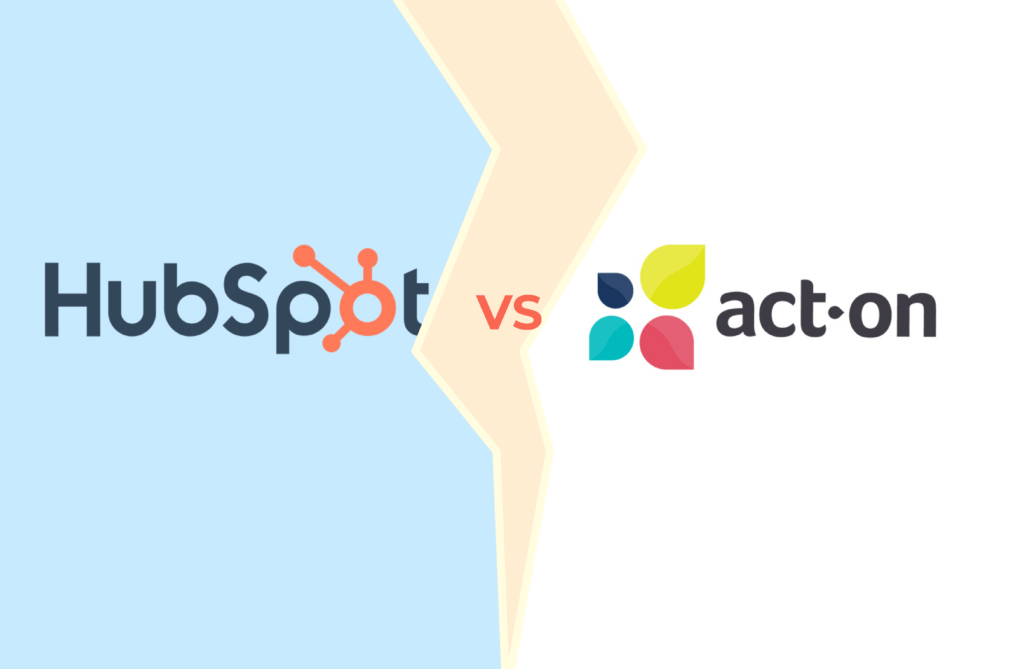I can guarantee that you’ve heard of Hubspot before. Hubspot is one of the most popular sales and marketing SaaS out there. But, there are tons of other tools out there that offer similar services. A close competitor of Hubspot is Act-On. Both of these tools offer dozens of services. From email marketing and sales management, to lead generation and analytics, and everything in between, both of these software have endless features to grow your business. With all of these options, it is so difficult to analyze Act-On vs Hubspot. That’s why I am here to help! Keep reading to find out which software is right for your business.
Act-On vs Hubspot: Cost
One of the first things your team will be concerned about is the cost. The cost of each service might make or break your decision. Understandably, price is one of the most important factors in choosing the right product for you, especially with such a big-ticket item.
Act-On
Their prices are based on how many active contacts you have. They define active contacts as a subset of your total contact database that you are actively marketing to, typically 40-60% of your contact database. They offer two packages, the professional, and the enterprise package. The professional package includes marketing automation, integrations, multichannel marketing programs, and CRM services. On the other hand, the enterprise plan includes account-based marketing, Data Studio, and more CRM services. The plans start at $900/month and $2000/month, respectively. These are starting prices, based on 2,500 active contacts. Unlike Hubspot, Act-On does not offer a free trial, free services, or a starter plan.
Hubspot
Hubspot offers free tools, in addition to individual marketing, sales, and customer service tools. They also have options to bundle tools to best suit your needs. Their plans start at $50/month with the starter plan and go up to professional and enterprise plans that are based on the number of marketing contacts your business requires, plus any add-ons you require. Some of the prices may be intimidating to startups looking to gain more understanding of their customers. This is why they offer the Hubspot for Startups Program, where clients can receive up to 90% off of their services.
Act-On vs Hubspot: Automation
So many businesses don’t get the most out of their marketing automation platform. Whether your team is looking to drive conversions, nurture leads, or create overall brand awareness, marketing automation is key to creating consistent content and providing an omnichannel experience.
Act-On
With Act-On marketing automation, every marketer can connect with prospects, convert leads, nurture, close deals, and optimize experiences to increase repeat business. They have four main tools to do this. The first is Lead Automation, where your team can track website visitors, and then create workflows, landing pages, and forms. The next is Automated Marketing Journeys. This tool creates a visual map, where your team can build multi-channel outreach programs (see image below). Third, their Lifecycle Marketing Automation tool is helpful when your team is looking to extend the customer relationship past the point of sale, increasing the number of repeat buyers. Lastly, Act-On’s Database Automation tool will help your team track and optimize your campaign’s performance with real-time data. Within their four main tools, you’ll have access to SEO, social media, and analytics to help you along the way.
Hubspot
Hubspot has an impressive repertoire of marketing automation tools. But, they are not all available at every subscription level. A few of my favorite Hubspot automation tools to use are Partitioning, SEO, and Ads. Partitioning is helpful when you have specific people or teams in your marketing department that only deal with certain topics. It allows you to separate all of your marketing assets by team, so every user has access to the right content. Next, Hubspot’s SEO tools are a great asset to businesses of any size. Managing your SEO in Hubspot can help elevate your authority in search engines and the analytics are easy to understand. Lastly, Hubspot’s Ads automation is amazing. All of your social media and Google Ads in one place, what’s better than that?
Act-On vs Hubspot: Customer Support
Nothing is more annoying than spending hundreds to thousands of dollars with a software company, and their customer service takes days to respond. Personally, bad customer support is a major factor that I consider when looking into new services. If the company doesn’t have a live chat or responsive support email, it can also be helpful to have a resource center where you can find the answer yourself.
Act-On
On both TrustRadius and G2 Crowd, Act-On has great customer service reviews. Some reviewers say they have some of the best customer service in the industry, and that they are fast and responsive. You can book a personalized demo, where their team can go through setting up your account and answer any specific questions you may have. Plus, their resource center is amazing, with webinars, training and certificates, eBooks, as well as a content library full of commonly asked questions and step-by-step guides.
Hubspot
Hubspot also has great reviews for its customer service on TrustRadius and G2 Crowd. Similar to Act-On, their reviews state that they are quick to respond, helpful, and professional. Hubspot offers great onboarding resources, including a live demo to train your staff on the new software. Hubspot has a blog, ebooks, guides, and free courses and certifications to ensure your team is on the same page. They also offer a ton of generalized resources on inbound marketing and sales.
Act-On vs Hubspot: Usability
Usability is another key factor in deciding on the right software for your team. If a software is confusing and difficult to use, no one on your team will be excited to use it. It is also important for the onboarding process to be seamless, so your team’s questions can get answered before they dive deep into the software.
Act-On
Act-On is a robust and easy-to-use tool. Reviewers say most actions are very intuitive and the tool is easy to navigate. They also mention that the interface is simple, and the metrics are broken down in a way that is easy to understand for all skill levels. Act-On offers a great onboarding experience and is ready to show your entire team how to get the most out of their services. Check out an example of their dashboard below:
Hubspot
Hubspot features a simple layout that makes it straightforward to navigate through. Reviewers say the dropdown menu along the top is very helpful to keep their teams organized. Many reviews mention how easy the Hubspot interface is to learn for first-time users, and that they are constantly making improvements to keep it this way. Hubspot’s onboarding is also outstanding, their team is excited to share the platform with others. Below is an example of the Hubspot dashboard:
Act-On vs Hubspot: Integrations
Integrations are a necessary part of choosing software for your business needs. If one offers direct integration with an important software, you’ll probably be more inclined to choose that one. Plus, it is always helpful to keep your integration options open, since you don’t know what you’ll be using in 5-10 years.
Act-On
Act-On directly integrates with Salesforce, Microsoft, Zoom, and SugarCRM. In addition, Act-On also integrates with Zapier, which means they can seamlessly integrate with thousands of other applications. They also have Business Intelligence Solutions, so you can export your Act-On data to Google Drive, Microsoft Azure, Power BI, and more.
Hubspot
Hubspot has one of the largest integration marketplaces out there, with over 500 integrations and several new partners joining each month. But, if you can’t find what you need, they also offer an integration with Zapier. Plus, if you don’t want to go through a third party to integrate, they welcome new software integration suggestions.
Wrap Up
I wish I could give you a straight answer on which software is better. The fact is, they are both great software. It just depends on what your goals as a business are. My advice would be to compare your business goals with what each platform offers. Then, I would look at reviews on G2 Crowd, TrustRadius, and Capterra, and see what people are saying. These sites are helpful because you can see the company size and position of the individual reviewing the software. You are also able to go through thousands of reviews that will help you make your decision. I hope this article was able to provide you with insight into what is best for your business!
 Identify
Identify Personalize
Personalize Benchmark
Benchmark Agencies
Agencies Integrations
Integrations Case Studies
Case Studies Use Cases
Use Cases Blog
Blog Resources
Resources



















